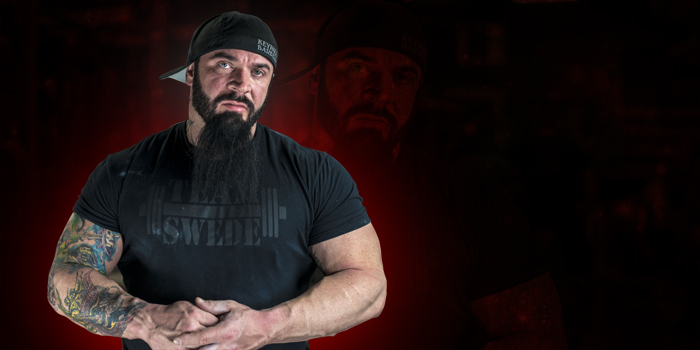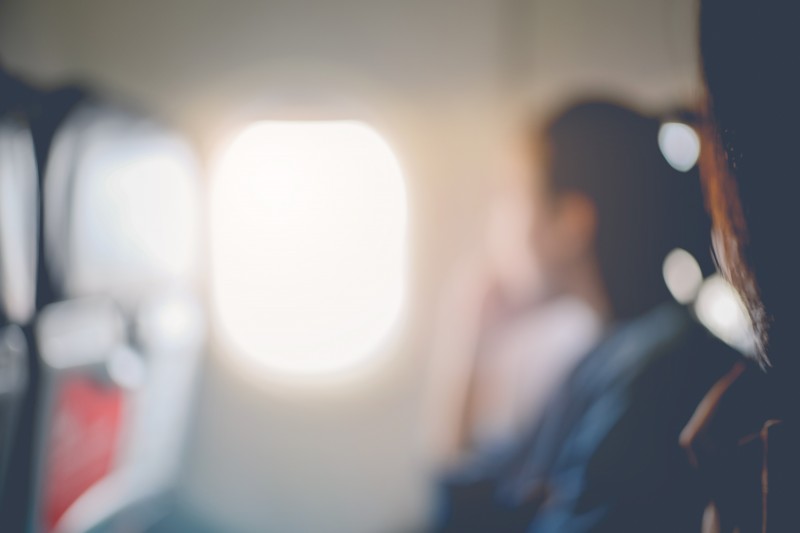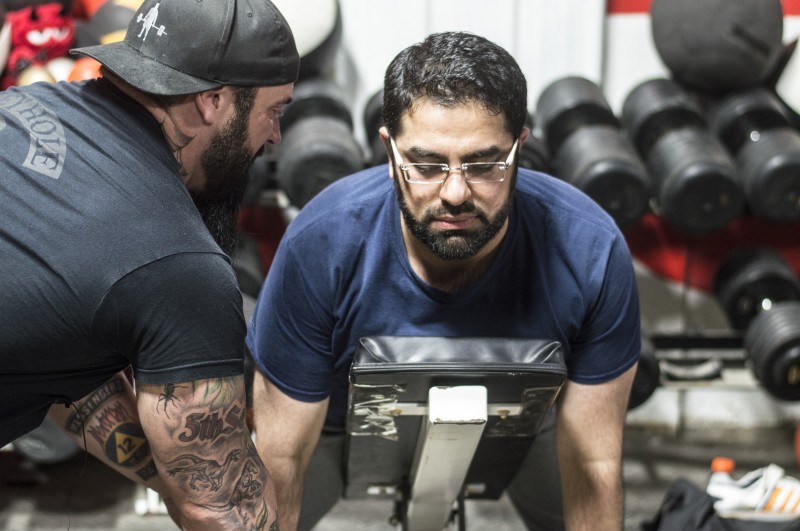
Fear is a god to some people. It's basically viral and if it infects one aspect of your life, it can metastasize and show up all over the place.
Earlier tonight, my plane back to Pittsburgh was forced to turn around and land, unexpectedly, at Dallas-Fort Worth. This was not our intended destination, nor was it even the airport we took off from. You see, we were experiencing engine failure within parameters that demand the plane be landed immediately.
Before we'd even taken off, there was a mechanical issue that caused us to turn around on the runway and go back so the plane could be serviced. Now, when an airplane has an equipment malfunction and is forced to return to the gate to possibly be "repaired" before takeoff, people start to look at the emergency exit doors like they just might be willing to jump out onto the tarmac.
Everyone was nervous at that point.
You could see the fear on their faces. And who wouldn't be afraid? Something wrong with the plane, before it is even in the air, sounds like the kind of ominous foreshadowing you witness in the first five minutes of a horror film. But this was no movie. Hell, even if it was, I'm not really a fan of Tom Hanks. So, I'm not sure what happens after a plane crash in movies. Based on the previews I've seen, I think you either end up on a deserted island with a soccer ball as a best friend or survive unscathed after floating around in the Hudson for a bit. In real life, though, I was pretty solid on the idea that we'd all die horrible, fiery deaths.
Nevertheless, after a mechanic made some adjustments "downstairs," we were assured the jet was in perfectly safe shape to fly.
It was about an hour later, at 30,000 feet, when our worst fears were confirmed. Some passengers began to notice that the plane seemed to be turning around because the picture on screen on the headrests in front of them showed a map of our course as we traveled. The pilot then announced that we were, in fact, heading back in the direction we'd come from. He informed us that one of the engines was not working correctly and the plane was not good to make it to our destination. He said we needed to land as soon as possible and were redirecting to touch down in Dallas, about fifteen minutes behind us.
Some people need silence to write. That has never been the case for me. I was alone in my own row, writing my ass off as all of this was going down. No fucking way was I getting a row to myself on the next flight if we even managed to make it to the ground safely. Cocksuckers. Anyway.
The plane was convulsing through some turbulence like an epileptic and packed with trepidatious passengers, most of which were carrying on loud, unintelligible conversations.
It didn't distract me from what I was doing at all. I may actually prefer some of background activity while I write. Of course, I would much rather it wasn't on a plane that seemed to be, both figuratively and literally, going down fast.
We survived the landing, but anyway, you slice it, the fear on that aircraft was understandable, absolutely. The thing about fear is that it can be understandable and still not be justified or helpful.
Last week, I lost another loved one. She was the closest to my heart of them all, and yet, somehow I am at peace with it.
For me, 2016 has been a year well seasoned with loss. While I haven't quite developed a taste for it, I am getting better at shoveling it down and carrying on with the other business of the day.
More palatable business like consuming tacos and writing. Both of which I am handling, right now.
Multitasking.
Grieving, eating, processing the events that transpired earlier tonight, writing, and soon to be arriving at the lesson I hope to offer with this article.
That is back where we started, at the thing which acts as an almighty deity to some us: fear.
I like to use the acronym FEAR with my people in some situations, the Frequent Exaggeration of Anticipated Risks. It's something which affects both lifters and coaches alike, and recently it seems like it does so in epidemic proportions. This type of fear is paralyzing.
But let's start by playing the devil's advocate because sometimes fear is justified.
An example of a time fear would be justified and the risks not exactly exaggerated would be under-qualified "coaches" (and I use that termly loosely in this context) who are afraid to allow their clients to learn from other coaches. The fear being that their clients will discover they are charlatans once they are exposed to real coaches who actually are qualified. They are right to be afraid of that.
This is something Dave Tate and I were discussing, after John Meadows' seminar at the S4 compound. He said I should touch on it in an article and this one is a good fit because here's the thing: if you're qualified and a good coach, you can't be disqualified by someone else simply based on their qualifications. That is assuming that you are actually qualified, which is a hefty assumption, considering the state of saturation the industry has with under-qualified and altogether unqualified coaches. This is a huge red flag lifters should watch out for and an easy way to identify them.
With my seminars, here's a recent story. I had an event host tell me he let another group of lifters in the area know we were going to be having a full day teaching and coaching event that they were welcome to attend. Apparently, their "coach" had already told them they weren't allowed to attend the event. Now this wasn't a federation issue, the way the IPF will ban certain seminars, these were not USAPL lifters, in fact, we had an IPF gold medalist in attendance at that event who learned a good deal from it. This was just a group of lifters who worked with a coach who hadn't even competed in powerlifting.
Are you shaking your head? It's actually pretty common.
The confusion about who is who is understandable, given the current landscape, especially for newer lifters who are eager to learn. However, a coach discouraging clients who want to learn from other teachers or experts, well, there is really only one obvious motive for that. They are afraid of getting exposed. And I can tell you first hand that it does happen in a seminar setting, though not as often as you'd think.
We don't teach to prove other teachers wrong. Rarely will I even comment on another coach's methods, unless what they are doing is outright foolishness. I teach these events with two different coaches who have different methods and opinions than my own and somehow we all manage to avoid being disqualified at any point. See how that works? We are qualified so that isn't something we have to worry about. It would be an exaggeration of anticipated risk. In other words, an irrational fear. Yet, what coaches do you know who'd be comfortable teaching alongside others with opposing views? I think it suffices to say only the good ones.
I've even heard of newer coaches with very little experience discouraging their lifters from reading articles from coaches with opposing views. This is reprehensible and on par with government sanctioned book banning. But I digress.
We can wrap that subject up by saying if a coach is trying to keep clients in the dark to the other options out there, there's an obvious reason for that. On the other hand, if a coach encourages their lifters to learn as much as they can from as many people as possible, even if that coach is not the most knowledgeable, they can still do a great job of helping clients on their way and hope remains for improving their own skill set. I'm really talking more to these coaches, here, than their lifters.
The moral of the story, aside from the warning signs of a shit coach, is that our fears, though they may be understandable, are often overstated.
MORE: The Obstacles You'll Face Becoming A Great Powerlifter
That stuff on the plane had everyone shook, but let's look at this rationally. A commercial jet is designed to be able to take off even if one engine fails on the runway. Most are Airbuses are certified to fly at least 180 minutes on one engine and it's possible to land with no engines working at all. Even if the plane does crash, survivability rate is 95.7%. If you took one flight per day, on average, you would need to fly every day for 55,000 years to be involved in a fatal plane crash. You're more likely to get electrocuted to death. Seriously.
So while the everyone being so terrified was understandable, even relatable, it wasn't helpful or justified. If we can recognize that, assess every situation and make rational decisions, desirable outcomes are more likely. How many things in powerlifting can that apply to?
In the example of a plane, there is not much we could have done to fuck things up, as far as an outcome, short of jumping out or breaking into the cockpit and trying to land it ourselves. But in powerlifting, man, people do all sorts of stupid shit, out of fear, which detracts from their chances for a positive outcome.
Program hopping, coach hopping, adjusting prescribed volume mid-cycle; as I meditate on this it becomes clear that fear, itself, directs so many poor decisions. Certainly fear can be useful, but it can also be crippling, sabotaging relationships (there might be someone better for you), progress in training (there might be a better program for you) and a "grass is greener" attitude toward business partnerships usually isn't conducive to long-term success, either.
I will leave you with a final piece of advice. Have the courage of your convictions. What I mean is make a decision and have the resolve to see it through. You'll thank me later.













1 Comment